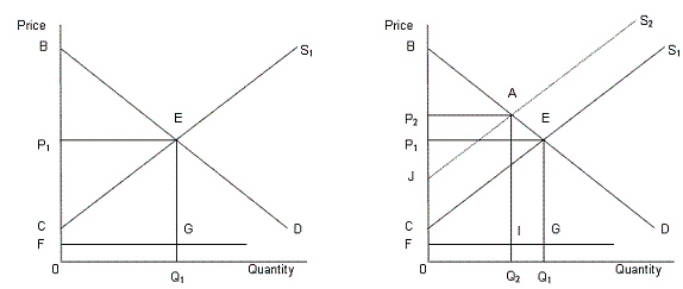Exam 12: Antitrust and Regulation
Exam 1: Economics: The World Around You90 Questions
Exam 2: Choice, opportunity Costs, and Specialization95 Questions
Exam 3: Markets, Demand and Supply, and the Price System98 Questions
Exam 4: The Market System and the Private and Public Sector100 Questions
Exam 5: Elasticity: Demand and Supply132 Questions
Exam 6: Consumer Choice142 Questions
Exam 7: Supply: The Costs of Doing Business106 Questions
Exam 8: Profit Maximization122 Questions
Exam 9: Perfect Competition135 Questions
Exam 10: Monopoly118 Questions
Exam 11: Monopolistic Competition and Oligopoly114 Questions
Exam 12: Antitrust and Regulation100 Questions
Exam 13: Market Failures, Government Failures, and Rent Seeking121 Questions
Exam 14: Resource Markets112 Questions
Exam 15: The Labor Market117 Questions
Exam 16: Capital Markets100 Questions
Exam 17: The Land Market and Natural Resources55 Questions
Exam 18: Aging, Social Security and Health Care88 Questions
Exam 19: Income Distribution,Poverty and Government Policy115 Questions
Exam 20: World Trade Equilibrium112 Questions
Exam 21: International Trade Restrictions109 Questions
Exam 22: Exchange Rates and Financial Links Between Countries132 Questions
Select questions type
Most natural monopolies are regulated at some level by government because:
(Multiple Choice)
4.8/5  (38)
(38)
In a natural monopoly,government regulation is often used to ensure more beneficial price and output combinations for consumers in the market than would exist in the absence of regulation.
(True/False)
4.8/5  (28)
(28)
International regulation occurs at two levels,one in which a specific government regulates the activities of individual firms operating within the country,and another in which several nations are involved.
(True/False)
4.8/5  (35)
(35)
Privatization occurs when a state owned firm is transferred to private ownership.
(True/False)
4.9/5  (40)
(40)
One reason that governments may intervene in the operation of a business through regulation is to:
(Multiple Choice)
4.8/5  (37)
(37)
Any kind of social regulation raises the per unit cost of production of a good and hence leads to a loss of producer and consumer surplus.
(True/False)
4.7/5  (35)
(35)
When regulators require that a natural monopoly sets price equal to average total cost:
(Multiple Choice)
4.7/5  (33)
(33)
Actions against alleged violators of the antitrust statutes may be initiated by the Justice Department,by the Federal Trade Commission,and by private plaintiffs.
(True/False)
4.8/5  (27)
(27)
When a monopoly is regulated it is required to sell lower output at a lower price.
(True/False)
4.9/5  (34)
(34)
One difference between economic and social regulation is that economic regulation usually pertains to a specific industry,whereas social regulation applies most if not all industries.
(True/False)
4.9/5  (38)
(38)
Which of the following is most likely to happen if the Federal Trade Commission (FTC) wins a suit against alleged violators of antitrust law?
(Multiple Choice)
4.9/5  (35)
(35)
Which of the following entities is able to sue a firm for alleged antitrust misbehavior in the U.S.?
(Multiple Choice)
4.8/5  (36)
(36)
The recession beginning in 2007 led many governments to begin encouraging trade.
(True/False)
4.9/5  (37)
(37)
According to the per se rule,activities that were potentially monopolizing tactics were illegal.
(True/False)
4.8/5  (41)
(41)
Which of the following practices is notrestricted by the antitrust law in the United States?
(Multiple Choice)
4.8/5  (42)
(42)
The International Communication Network which is the successor of GATT settles trade disputes among its member countries.
(True/False)
4.8/5  (40)
(40)
In the United States,monopoly regulation began primarily because:
(Multiple Choice)
4.9/5  (39)
(39)
In the following figure,the first panel shows a market situation prior to regulation and the second panel shows the effects of regulation. Figure 12.2  In the figure,
D: Demand curve for automobiles
S1: Supply curve of automobiles prior to regulation
S2: Supply curve of automobiles after regulation
FG: Clean up cost per unit
-Refer to Figure 12.2.The regulation will benefit the society if:
In the figure,
D: Demand curve for automobiles
S1: Supply curve of automobiles prior to regulation
S2: Supply curve of automobiles after regulation
FG: Clean up cost per unit
-Refer to Figure 12.2.The regulation will benefit the society if:
(Multiple Choice)
4.8/5  (34)
(34)
Antitrust laws in the United States rely more on economic theory and the rule of reason approach,whereas the European Union relies more on the per se approach.
(True/False)
4.7/5  (42)
(42)
Showing 21 - 40 of 100
Filters
- Essay(0)
- Multiple Choice(0)
- Short Answer(0)
- True False(0)
- Matching(0)